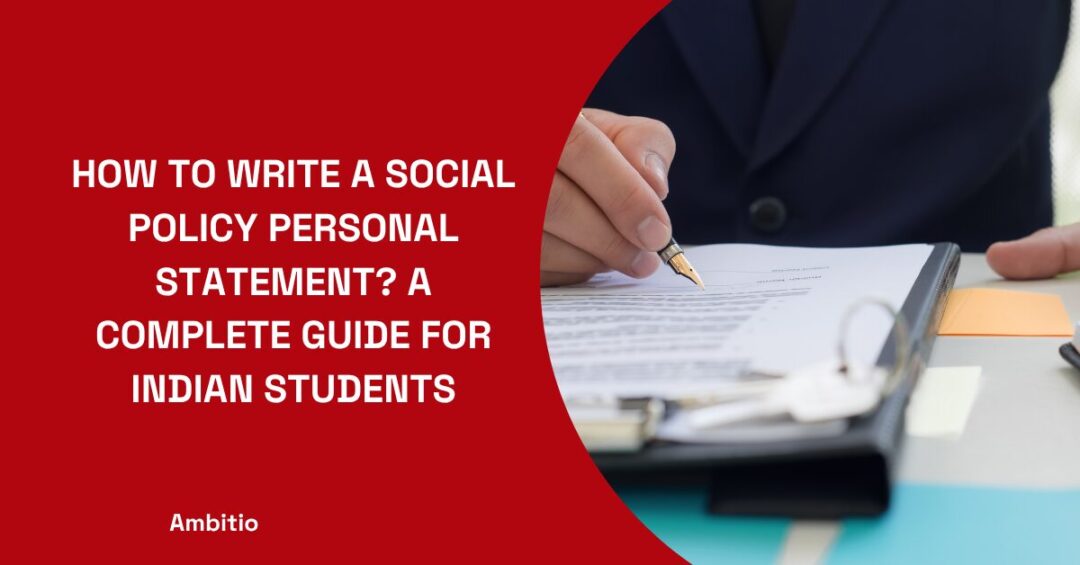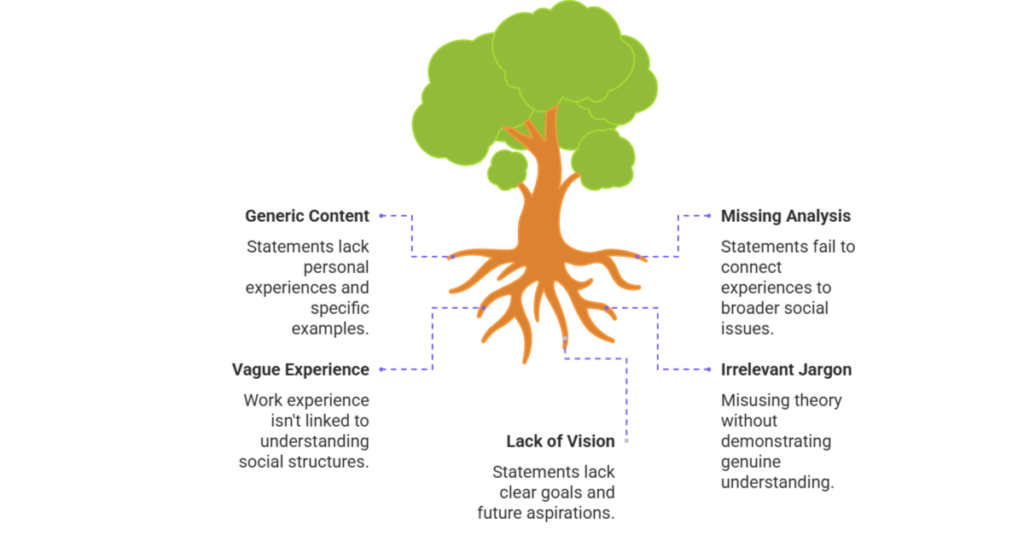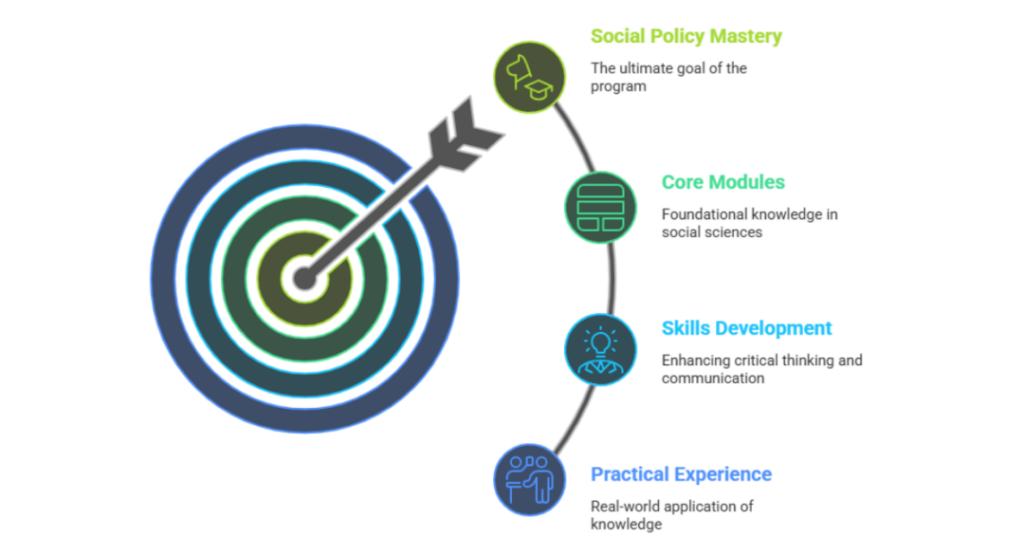2 June 2025
5 minutes read
How To Write A Social Policy Personal Statement? A Complete Guide For Indian Students

Key Takeaways
- Nail your social policy personal statement by showing lived experience, not generic passion.
- Use work experience and real stories to prove your understanding of social problems.
- A Master’s in Social Policy focuses on real-world policy, not just theory or buzzwords.
Everyone wants to change the world—until they have to write a 4,000-character UCAS personal statement. That’s the reality most Indian students face when applying to sociology or social policy programmes in the UK. You’re expected to compress your life, passion, purpose, and work experience into a single page—and somehow sound insightful, original, and ‘socially aware’ while doing it.
But but but… most statements end up sounding like copy-paste versions of each other: generic, robotic, forgettable. But if you actually want to stand out—not just submit—then you need to approach this with clarity, purpose, and real-life impact. This guide is here to help you do exactly that. No fluff. Just results.
What To Include In Your Personal Statement?
If your personal statement reads like it could belong to anyone else, it’s already failed. Most Indian students cram in buzzwords like “keen interest” and “helping others” without showing why it matters, how it came to be, or what they bring to the table. This isn’t a college essay from school—this is your shot to convince someone that you’re not just interested in society, but ready to think critically, act responsibly, and bring lived experiences into academia.

Here’s what your statement actually needs to include if you want it to land.
1. Real Experiences, Not Just ‘Keen Interest’
Saying you want to study social policies means nothing unless you’ve lived, seen, or done something about them. Talk about personal experiences—witnessing inequality, working with special needs, or seeing a barrier in your community. Studying sociology starts with understanding people, not paragraphs.
2. Link Your Story to the Bigger Picture
Unis don’t just want emotion—they want analysis. If you’ve seen social problems up close, show how they tie into modern society. Connect personal experiences to social class, behaviour, or policy gaps. That’s how you show you’re ready to study social issues academically.
3. Use Your Work Experience Wisely
Forget buzzwords. Instead, show how your work experience helped you understand social structures, improve communication, or pick up transferable skills. Whether it’s volunteering or helping someone access social care, unis care more about what it taught you than where it was.
4. Name Drop the Right Way
You don’t need to throw around Marxist theory to sound smart. But if you study a range of topics—like criminology and social anthropology—say how they shaped your thinking. This proves you’re choosing this area of study for a reason, not because it sounded nice on a UCAS form.
5. Where You’re Going, Not Just Where You’ve Been
Don’t stop at “I wish to study this subject.” What next? Do you want to become a social worker, go into organisation, or work in policy? Show a goal. Whether it’s a combined honours plan or a chance to study at one of the top undergraduate universities, clarity beats cliché every time.
What Masters In Social Policy Is All About?
If you think a Master’s in Social Policy is just about “helping people” and quoting Marx, you’re already missing the point.
This course isn’t a glorified extension of your undergrad degree—it’s where theory gets its hands dirty. You go beyond talking about inequality to analysing the social class systems that keep it alive. You stop writing safe personal statement examples and start questioning how social policies actually work in modern society. For Indian students who’ve chosen to study social science seriously, this programme is your toolkit for changing the system—not just complaining about it.

Here’s what it actually includes:
- Deep dives into how social problems are created, sustained, and solved across society as a whole through real-world policy decisions
- Exploration of social care, social work, and organisation structures that affect everything from special needs to income distribution
- Core modules that let you study a range of topics like criminology, social anthropology, and public behaviour—perfect if you’re into combined honours or two subjects
- Intense focus on essay writing, critical thinking, and policy-driven communication skills that help you improve my communication and develop transferable skills
- Opportunities for field-based work experience and research, especially useful for those who want to study further or become a social worker
10 Top Undergraduate Universities To Study Social Policy
A degree in social policy isn’t just about understanding society—it’s about changing it. In today’s world, where social inequalities and systemic issues are increasingly prominent, studying social policy equips students with the tools to analyze, develop, and implement policies that can make a tangible difference. For Indian students aiming to pursue this field, selecting the right undergraduate program is crucial.
So here is a list of uni we have compiled for you:
| University | Average Tuition Fees (per year) | Average Graduate Salary | Documents Required |
|---|---|---|---|
| Harvard University | $51,925 | $50,000–$70,000 | High school transcript, SAT/ACT, TOEFL/IELTS, Personal Statement, Recommendations |
| Stanford University | $56,169 | $50,000–$70,000 | High school transcript, SAT/ACT, TOEFL/IELTS, Personal Statement, Recommendations |
| University of California, Berkeley | $44,008 (out-of-state) | $45,000–$65,000 | High school transcript, SAT/ACT, TOEFL/IELTS, Personal Statement, LORs |
| University of Michigan | $53,232 (out-of-state) | $45,000–$65,000 | High school transcript, SAT/ACT, TOEFL/IELTS, Personal Statement, Recommendations |
| New York University | $54,880 | $45,000–$65,000 | High school transcript, SAT/ACT, TOEFL/IELTS, Personal Statement, Recommendations |
| University of Oxford | £28,370 | £25,000–£30,000 | Transcript, Personal Statement, IELTS/TOEFL, Reference Letters, UCAS Application |
| University of Cambridge | £28,000 | £25,000–£30,000 | Transcript, Personal Statement, IELTS/TOEFL, Reference Letters, UCAS Application |
| London School of Economics (LSE) | £23,330 | £25,000–£30,000 | Transcript, Personal Statement, IELTS/TOEFL, Reference Letters, UCAS Application |
| University of Edinburgh | £23,200 | £25,000–£30,000 | Transcript, Personal Statement, IELTS/TOEFL, Reference Letters, UCAS Application |
| University of Bristol | £20,100 | £25,000–£30,000 | Transcript, Personal Statement, IELTS/TOEFL, Reference Letters, UCAS Application |
Conclusion
Focus on your lived experiences, your specific interest in social change, and how you see yourself contributing to society—not in theory, but in practice. If you’ve chosen to study this subject to study, show the reader you’ve thought about the area of study, the barriers involved, and the actual work it takes to affect society.
In the end, the best applications aren’t written to tick boxes. They’re written by people who understand social systems, analyse them critically, and are simply ready to do the work. Be that person.
Most applicants struggle to write a perfect personal statement but end up sounding arrogant — but you won’t. At Ambitio, our AI-powered study abroad experts help you craft a powerful, standout statement that gets noticed. No fluff, no clichés—just a compelling story that proves you belong. Schedule a call with Ambitio’s experts.
FAQs
What is a Master’s in Social Policy?
A Master’s in Social Policy equips students with the knowledge and skills to analyze, design, and implement policies that promote equality, justice, and well-being for individuals and communities
What are common specializations in Social Policy?
Specializations include Social Health Policy, Development Policy, Environment and Energy Policy, Global Policy, and Social Policy Area Concentrations
What are the typical entry requirements?
Most programs require a bachelor’s degree (often a lower second-class or equivalent), though some accept degrees from any discipline
Is work experience required?
Work experience is not always required but can strengthen your application. Some programs give preference to those with relevant experience
What skills are needed for a Master’s in Social Policy?
Key skills include research and data analysis, critical thinking, communication, and a passion for social justice
What career opportunities are available after graduation?
Graduates can work as policy analysts, public affairs consultants, community development coordinators, education administrators, or international aid workers

You can study at top universities worldwide!
Get expert tips and tricks to get into top universities with a free expert session.
Book Your Free 30-Minute Session Now! Book a call now




























